2018年秋八年级英语上册Unit5WildanimalsPeriod5Integratedskills
译林版初中英语八年级上册期末复习Units5-8单元知识点梳理归纳

译林版初中英语八年级上册期末复习Units5-8单元知识点梳理归纳译林版初中英语八年级上册Unit5 Wild animals知识点梳理【词形变化】1.die vi.死→dead adj.死的→death n.死,死亡2.mean vt.意思是,意味着→meaning n.意思→meaningful adj.有意义的→meaningless adj.无意义的3.born adj.出生的→birth n.出生4.beginning n.开始,起初→begin vt.&vi.开始5.sadly adv.令人遗憾地;伤心地→sad adj.伤心的,难过的→sadness n.伤心,悲伤6.mainly adv.主要地,大部分→main adj.主要的7.danger n.危险→dangerous adj.危险的8.action n.行动;行为→act vt.& vi.行动,表演→active adj.积极的,活跃的→actively adv.积极地,活跃地9.closed adj.关闭的→close vt.&vi.关,关闭→close adj.紧密的,亲密的→closely adv.紧密地10.lost adj.迷路的,迷失的→lose vt.遗失,失去11.hunter n.猎人→hunt vt.& vi.打猎,猎杀12.living n.生存,生计→living adj.活的,现存的→live vi.居住,生活13.illness n.疾病→ill adj.生病的14.slowly adv.缓慢地→slow adj.缓慢的【重点短语】1.live in the wild 生活在野外2.have/take pity on wild animals 同情野生动物3.at four months old 在四个月大时4.weigh over 35 kilograms 重达35公斤多5.for the first time 第一次6.in the beginning 一开始7.learn to look after oneself 学会照顾自己8.live on a special kind of bamboo 以一种特殊的竹子为生9.as a result 因此10.in danger 处境危险11.take action right away 马上采取行动12.build more panda reserves 建造更多的熊猫自然保护区13.make laws to protect pandas 制定法律保护大熊猫14.at birth 出生时,诞生时15.work out easy Maths problems 算出简单的数学问题16.with the help of their mouth and ears 借助于它们的嘴巴和耳朵17.get lost 迷路18.be dangerous to humans 对人类有危险19.lose their lives 丧失他们的生命20.in the daytime 在白天【重点句型】1.So could you please not eat them?(P56)句意:所以请你不要吃掉它们好吗?Could you please…?意为“请你……好吗?”,其中Could不表示过去,只表示比can更有礼貌的请求,属非正式请求,语气较委婉;please 之后要接动词原形,其否定形式是在please之后加not,即Could you please not…?其肯定回答常用Sure./Certainly./of course,I'd love to.其否定回答常用Sorry.…如:一Could you please teach me how to swim? 请你教我如何游泳好吗?一Certainly.当然可以。
【配套K12】[学习]2018年秋八年级英语上册 Unit 5 Wild animals Perio
![【配套K12】[学习]2018年秋八年级英语上册 Unit 5 Wild animals Perio](https://img.taocdn.com/s3/m/3ae7bd951a37f111f1855bb2.png)
Unit 5 Wild animalsGrammarPeriod 3●1 closed adj.关闭的[观察] The horse is standing with its eyes closed.那匹马正闭着眼睛站着。
Make sure all the windows are closed.确保所有的窗户都关好了。
[探究] closed的反义词为________,意为“____________”。
[拓展] closed的动词形式为________,意为“________”。
活学活用1. Jim lay on the bed ________ just now.A.with the door closeB.with the door openedC.with the door closedD.by the door open●2 save vt.& vi.储存,节省[观察] They always save some food before winter comes.在冬季来临之前,它们总会储存一些食物。
Save some food for your sister.给你姐姐留点吃的。
[探究] save既可作及物动词,也可作不及物动词,意为“储存,节省”。
作“节省”讲时,反义词为________。
save的过去式为________。
I'm saving for a new bike.我正攒钱想买辆新自行车。
[拓展] save作________动词,还可译为“挽救”。
________________ 表示“挽救某人的生命”。
Doctors were unable to save him.医生未能把他救活。
2.(1)─Why is online shopping getting more and more popular?─I think it can ________ a lot of time.A.protect B.saveC.begin D.take(2)作为一名医生,尽全力挽救每个病人的生命是我的责任。
牛津译林版八年级上册Unit5《Wildanimals》(Reading1)说课稿
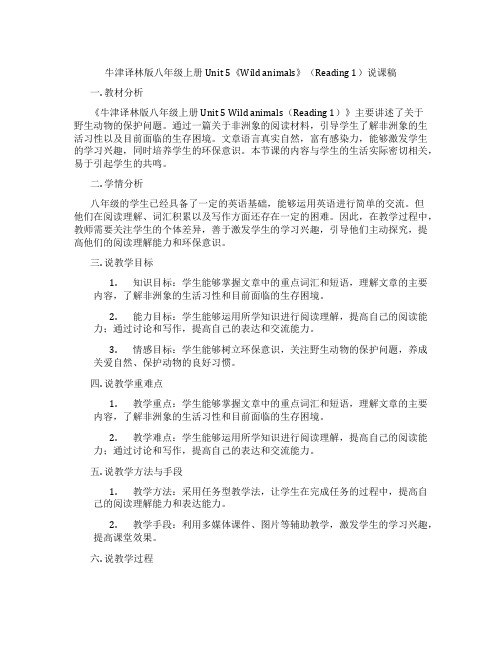
牛津译林版八年级上册Unit 5《Wild animals》(Reading 1)说课稿一. 教材分析《牛津译林版八年级上册Unit 5 Wild animals(Reading 1)》主要讲述了关于野生动物的保护问题。
通过一篇关于非洲象的阅读材料,引导学生了解非洲象的生活习性以及目前面临的生存困境。
文章语言真实自然,富有感染力,能够激发学生的学习兴趣,同时培养学生的环保意识。
本节课的内容与学生的生活实际密切相关,易于引起学生的共鸣。
二. 学情分析八年级的学生已经具备了一定的英语基础,能够运用英语进行简单的交流。
但他们在阅读理解、词汇积累以及写作方面还存在一定的困难。
因此,在教学过程中,教师需要关注学生的个体差异,善于激发学生的学习兴趣,引导他们主动探究,提高他们的阅读理解能力和环保意识。
三. 说教学目标1.知识目标:学生能够掌握文章中的重点词汇和短语,理解文章的主要内容,了解非洲象的生活习性和目前面临的生存困境。
2.能力目标:学生能够运用所学知识进行阅读理解,提高自己的阅读能力;通过讨论和写作,提高自己的表达和交流能力。
3.情感目标:学生能够树立环保意识,关注野生动物的保护问题,养成关爱自然、保护动物的良好习惯。
四. 说教学重难点1.教学重点:学生能够掌握文章中的重点词汇和短语,理解文章的主要内容,了解非洲象的生活习性和目前面临的生存困境。
2.教学难点:学生能够运用所学知识进行阅读理解,提高自己的阅读能力;通过讨论和写作,提高自己的表达和交流能力。
五. 说教学方法与手段1.教学方法:采用任务型教学法,让学生在完成任务的过程中,提高自己的阅读理解能力和表达能力。
2.教学手段:利用多媒体课件、图片等辅助教学,激发学生的学习兴趣,提高课堂效果。
六. 说教学过程1.Pre-reading:教师通过展示一些关于野生动物的图片,引导学生谈论自己喜欢的动物,激发学生的学习兴趣。
2.While-reading:教师引导学生快速阅读文章,回答一些简单的问题,帮助学生理解文章大意。
2018年秋八年级英语上册Unit5WildanimalsPeriod5Task

A.instead
B.however
C.otherwise
D.anyway
【解析】考查词语辨析。instead意为“相反”;however意为“然而”; otherwise意为“否则,要不然”;anyway意为“无论如何”。根据句意“我
Period 5 Task & Selfassessment
可数 [探究] report为________ 名词。
a weather report [搭配] ________________ 天气预报
an accident report ________________ 事故报告
report [拓展] ________ vt.报告,发表
[拓展] otherwise还可译为“除此以外”。 There was some music playing upstairs. Otherwise, the house was silent. 楼上有些音乐声。除此以外,房子里静悄悄的。
Period 5 Task & Selfassessment
Unit 5 Wild animals
Period 5 Task & Selfassessment
Unit 5 Wild animals
Period 5
Task & Selfassessment
课前自主预习 课堂互动探究
Period 5 Task & Selfassessment
课前自主预习
们得早点去,________我们可能就没有座位了”可知答案为C。
仅供学习交பைடு நூலகம்!
八年级上册英语unit5 Wild animals 单元知识点总结
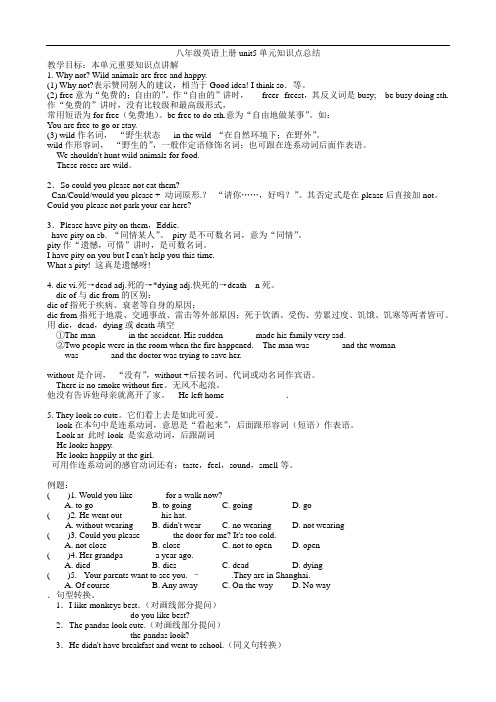
八年级英语上册unit5单元知识点总结教学目标:本单元重要知识点讲解1. Why not? Wild animals are free and happy.(1) Why not?表示赞同别人的建议,相当于Good idea! I think so.等。
(2) free意为“免费的;自由的”。
作“自由的”讲时,-- freer--freest,其反义词是busy; be busy doing sth. 作“免费的”讲时,没有比较级和最高级形式,常用短语为for free(免费地)。
be free to do sth.意为“自由地做某事”。
如:You are free to go or stay.(3) wild作名词,“野生状态in the wild “在自然环境下;在野外”。
wild作形容词,“野生的”,一般作定语修饰名词;也可跟在连系动词后面作表语。
We shouldn't hunt wild animals for food.These roses are wild。
2.So could you please not eat them?Can/Could/would you please + 动词原形.?“请你……,好吗?”。
其否定式是在please后直接加not。
Could you please not park your car here?3.Please have pity on them,Eddie.have pity on sb. “同情某人”。
pity是不可数名词,意为“同情”。
pity作“遗憾,可惜”讲时,是可数名词。
I have pity on you but I can't help you this time.What a pity! 这真是遗憾呀!4. die vi.死→dead adj.死的→*dying adj.快死的→death n死。
die of与die from的区别:die of指死于疾病、衰老等自身的原因;die from指死于地震、交通事故、雷击等外部原因;死于饮酒、受伤、劳累过度、饥饿、饥寒等两者皆可。
2018年秋八年级英语上册 Unit 5 Wild animals Period 1 Comic s

Unit 5 Wild animals Period 1 Comic strip & Welcome to the unit
重点单词
1.wild adj. 野生的n. 自然环境,野生状态
2.free adj. 自由的,不受束缚的
3.dish n. 一道菜;盘,碟
4.pity n. 同情
5.die vi. 死
6.dolphin n. 海豚
7.squirrel n. 松鼠
8.zebra n. 斑马
9.die vi.—dead adj.—death n.
10.free adj.—freely adv.
重点短语
1.have/take pity on 同情,怜悯
2.no way 〈口〉不可能
3.in fact 实际上,事实上
2 2 4.in the wild 在野外
重点句型
1.They may become dishes on the table any time.
它们也许随时会变成餐桌上的菜。
2.—So could you please not eat them?—No way. “那么,你能不吃它们吗?”“不可能。
”
公交小句
1.—May I watch TV, Mum?—No, you can't.
“妈妈,我可以看电视吗?”“不,你不能。
”2.—Could you please turn off the TV?
—Sorry, I can't. I want to watch the sports news. “你能把电视关掉吗?”
“对不起,不能。
我想看体育新闻。
”。
八年级英语上册Unit5 Wild animals单元知识点背诵讲义

八年级英语上册8A Unit5 背诵讲义一、单词二、英文释义1. be born---come into the world as a baby2. in the beginning--- at first3. serious---bad or dangerous4. mainly---more than anything else5. take action--- do something6. none--- not any三、短语1. 生活在野外 live in the wild2. 同情某人 have/take pity on sb3. 事实上 in fact4. 最爱…… like … best / most5. 动物世界的王者 the king of the animal world6. 关于……的报告 a report on sth / sb7. 称呼某人…… call sb sth8. 看起来像一只小白鼠 look like a white mouse9. 在四个月大的时候 at four months old = when sb be four months old10. 第一次外出 go out for the first time11. 不再…… not … any more (longer) = no more (longer)12. 起初 in the beginning / at the beginning of13. 面临严重的问题 face serious problems14. 主要依赖一种特殊的竹子生存 live mainly on a special kind of bamboo1.野生的 adj. 自然环境,野生状态 n. wild2. 一道菜;盘,碟 n. dish3. 大熊猫 n. giant panda4. 斑马 n. zebra5. 法律,法规 n. law6. 生存,生计 n. living7. 人 n. human8. 遗憾,可惜 n. pity9. 憾事,羞愧 n. shame 10. 疾病 n. illness 11. 报告 n. report 12. 尾巴 n. tail 13. 昆虫 n. insect 14. 白天 n. daytime 15.一会儿,一段时间 n. while 16. 令人遗憾地,不幸地,伤心地 adv. sadly 17. 缓慢地 adv. slowly18. 死 vi. die 19. 意思是,意味着 vt. mean 20. 面临,面对 vt. face 21. 储存,节省 vt. & vi. save 22. 捉住,捕获 vt. catch 23. 失去,被……夺去;输掉 vt. lose 24. 杀死 vt. & vi.kill 25. 卖,出售 vt. & vi.sell 26. 行动,表演 vt. & vi.act 27.接受 vt. & vi.accept 28.活动,移动,搬迁 vt. & vi.move 29. 自由的,不受束缚的 adj.free 30. 关闭的 adj.closed 31. 迷路的,迷失的 adj.lost 32. 难过的,遗憾的 adj.sorry 33. 厚的, 密的,浓的 adj.thick 34. 没有一个(人或物) pron.none15. 变得越来越小become smaller and smaller16. 结果,因此as a result (of … )17. 有住的地方have a place to live18. 处于困境/脱离困境in danger / out of danger19. 采取行动做某事take action(s) to do sth20. 立刻,马上right away / right now21. 帮助熊猫繁殖更多的宝宝help pandas have more babies22. 建立更多的熊猫保护区build more panda reserves23. 制定法律保护熊猫make laws to protect pandas24. 采取措施do something不采取措施. do nothing25. 有志者,事竟成。
八年级英语上册Unit5Wildanimals重要知识点新版牛津版
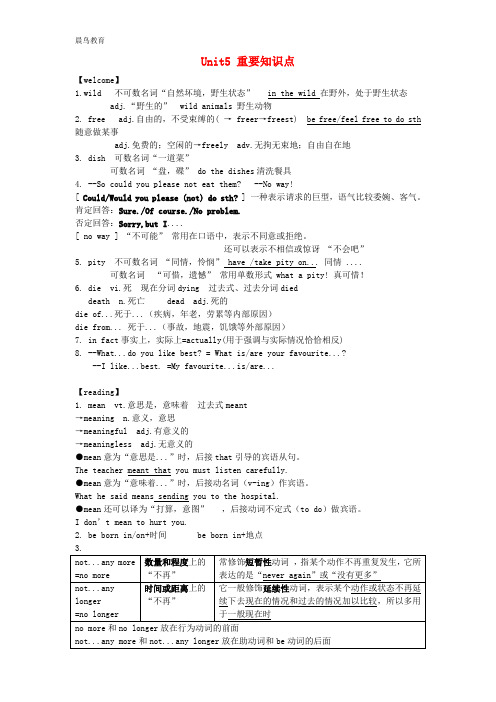
Unit5 重要知识点【welcome】1.wild 不可数名词“自然坏境,野生状态” in the wild 在野外,处于野生状态adj.“野生的” wild animals 野生动物2.free adj.自由的,不受束缚的( → freer→freest) be free/feel free to do sth 随意做某事adj.免费的;空闲的→freely adv.无拘无束地;自由自在地3.dish 可数名词“一道菜”可数名词“盘,碟” do the dishes清洗餐具4.--So could you please not eat them? --No way![ Could/Would you please (not) do sth? ] 一种表示请求的巨型,语气比较委婉、客气。
肯定回答:Sure./Of course./No problem.否定回答:Sorry,but I....[ no way ] “不可能”常用在口语中,表示不同意或拒绝。
还可以表示不相信或惊讶“不会吧”5.pity 不可数名词“同情,怜悯” have /take pity on... 同情 ....可数名词“可惜,遗憾”常用单数形式 what a pity! 真可惜!6.die vi.死现在分词dying 过去式、过去分词dieddeath n.死亡 dead adj.死的die of...死于...(疾病,年老,劳累等内部原因)die from... 死于...(事故,地震,饥饿等外部原因)7.in fact事实上,实际上=actually(用于强调与实际情况恰恰相反)8.--What...do you like best? = What is/are your favourite...?--I like...best. =My favourite...is/are...【reading】1.mean vt.意思是,意味着过去式meant→meaning n.意义,意思→meaningful adj.有意义的→meaningless adj.无意义的●mean意为“意思是...”时,后接that引导的宾语从句。
八年级英语上册 Unit 5 Wild animals教案2.doc
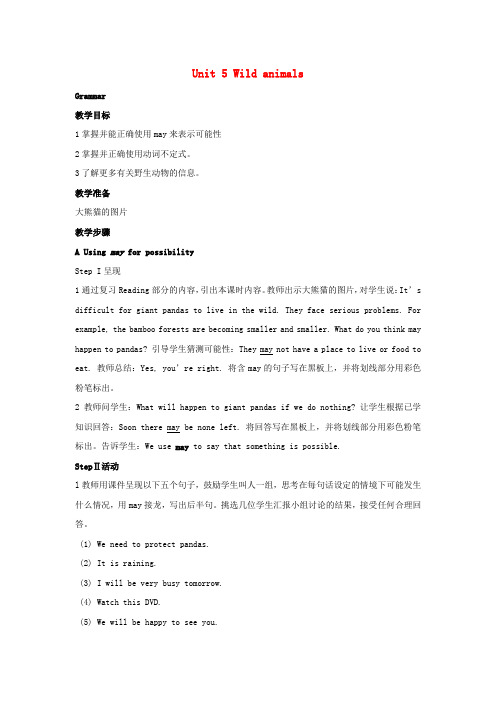
Unit 5 Wild animalsGrammar教学目标1掌握并能正确使用may来表示可能性2掌握并正确使用动词不定式。
3了解更多有关野生动物的信息。
教学准备大熊猫的图片教学步骤A Using may for possibilityStep I呈现1通过复习Reading部分的内容,引出本课时内容。
教师出示大熊猫的图片,对学生说:It’s difficult for giant pandas to live in the wild. They face serious problems. For example, the bamboo forests are becoming smaller and smaller. What do you think may happen to pandas? 引导学生猜测可能性:They may not have a place to live or food to eat. 教师总结:Yes, you’re right. 将含may的句子写在黑板上,并将划线部分用彩色粉笔标出。
2教师问学生:What will happen to giant pandas if we do nothing? 让学生根据已学知识回答:Soon there may be none left. 将回答写在黑板上,并将划线部分用彩色粉笔标出。
告诉学生:We use may to say that something is possible.StepⅡ活动l教师用课件呈现以下五个句子,鼓励学生叫人一组,思考在每句话设定的情境下可能发生什么情况,用may接龙,写出后半句。
挑选几位学生汇报小组讨论的结果,接受任何合理回答。
(1) We need to protect pandas.(2) It is raining.(3) I will be very busy tomorrow.(4) Watch this DVD.(5) We will be happy to see you.2让学生独立完成课本第61页的练习,然后两人一组互相检查,鼓励学生互相问答,进一步体会和理解may的用法。
译林版八年级英语上册Unit 5 Wild animals 第5课时 Integrated Skills教案
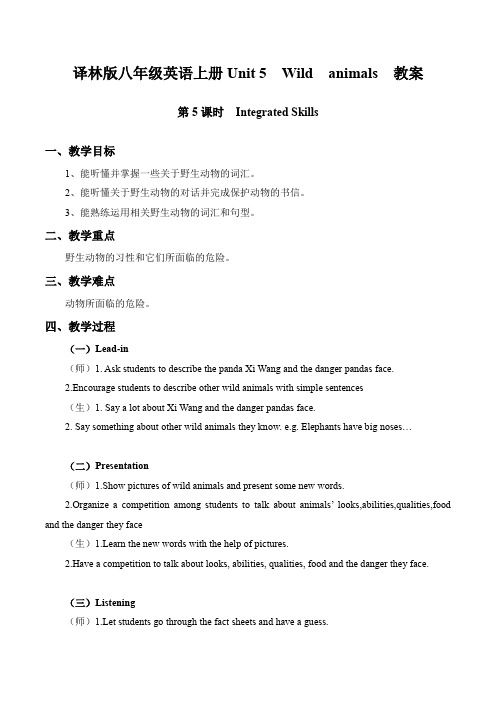
译林版八年级英语上册Unit 5 Wild animals 教案第5课时Integrated Skills一、教学目标1、能听懂并掌握一些关于野生动物的词汇。
2、能听懂关于野生动物的对话并完成保护动物的书信。
3、能熟练运用相关野生动物的词汇和句型。
二、教学重点野生动物的习性和它们所面临的危险。
三、教学难点动物所面临的危险。
四、教学过程(一)Lead-in(师)1. Ask students to describe the panda Xi Wang and the danger pandas face.2.Encourage students to describe other wild animals with simple sentences(生)1. Say a lot about Xi Wang and the danger pandas face.2. Say something about other wild animals they know. e.g. Elephants have big noses…(二)Presentation(师)1.Show pictures of wild animals and present some new words.anize a competition among students to talk about animals’ looks,abilities,qualities,food and the danger they face(生)1.Learn the new words with the help of pictures.2.Have a competition to talk about looks, abilities, qualities, food and the danger they face.(三)Listening(师)1.Let students go through the fact sheets and have a guess.2.Play the tape twice.3.Check and ask students to describe them(生)1.Go through the fact sheets and guess the answer.2.Listen and complete.3.Describe them with sentences.(四)Practice(师)1.Guide students to go through the letter in A2 to know the main purpose and the main idea.2.Let students complete the letter.3.Let students check answers in pairs and then in class.(生)1.Read first to know the main purpose and the main idea.plete the letter.3.Check answers in pairs then in class(五)Writing(师)1. Guide students to choose another animal to write about like the letter.2.Guide students to make a poster in groups(生)1.Choose another animal to write2.Share in groups of 4 or 63.Stick all the articles in a big piece of paper to make a poster.(六)Speak up(师)1.Guide students to think about ways to protect animals.2.Let students listen and find Millie a nd her mum’s idea.3.Guide students to make similar dialogues.(生)1.Discuss the ways to protect the animals2.Listen and find Millie and her mum’s idea.3.Make a similar dialogue in pairs.(七)Conclusion(师)The teacher make a conclusion: Animals are our friends. Everybody should act to protect wild animals.(生)Each group choose a student to hold their poster to stand in the front.五、当堂训练There is a reserve in Jiangsu called the Yancheng Reserve. A special girl worked there. Her name was Xu Xiujuan. Xu Xiujuan came from Heilongjiang Province. She came to work in the Yancheng Reserve in 1986.For a long time, her family cared for cranes in the Zhalong Nature Reserve in North-east China.The Zhalong Nature Reserve is the summer home of many red-crowned cranes. The cranes start their families there. In the Zhalong Nature Reserve, Xu Xiujuan’s job was to help the workers of the reserve care for the cranes when they had babies.Xu Xiujuan enjoyed her work very much .In her diary she wrote “I love cranes and I l ove nature. when I walk in the countryside, I forget the unhappiness in my life”.On 16th September 1987,two little cranes from the Yancheng Reserve flew into the wild and did not come back .It was evening. Xu Xiujuan was worried and went to look for them. Someone told her that a farmer caught the birds. She tried to get to the farmer’s house as quickly as possible. she took a short cut, but she had to cross a river. Sadly, the river was much deeper than she thought. The young girl lost her life when she was just twenty three years old. Xu Xiujuan gave her life to the lovely red-crowned cranes.1.Where did Xu Xiuhuan come from?(不超过三个单词)_________________________________________________________2.What special animals live in Yancheng Nature Reserve?(不超过三个单词)_________________________________________________________3.What was Xu’s job?_________________________________________________________4.In which year did Xu Xiujuan die?(不超过三个单词)__________________________________________________________5.What do you think of Xu Xiujuan?(不超过五个单词)___________________________________________________________ 六、教学反思。
八年级英语上册+重点短语+核心句型+第5单元(Unit5 Wild animals)
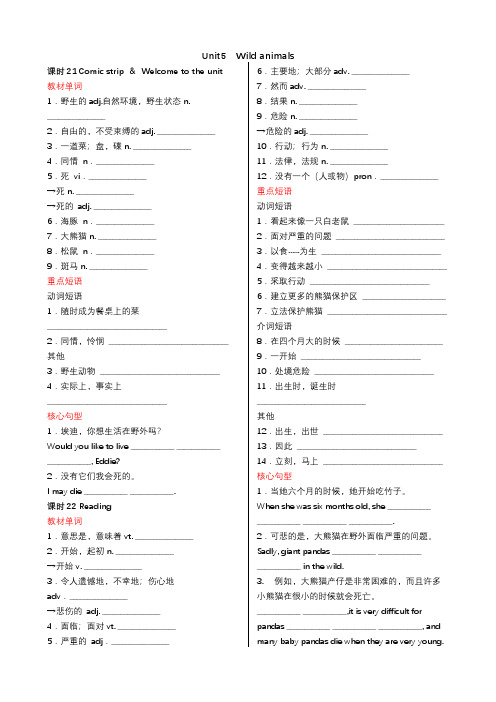
Unit5 Wild animals课时21 Comic strip &Welcome to the unit 教材单词1.野生的adj.自然环境,野生状态n.________________2.自由的,不受束缚的adj. ________________ 3.一道菜;盘,碟n. ________________4.同情n.________________5.死vi.________________→死n. ________________→死的adj. ________________6.海豚n.________________7.大熊猫n. ________________8.松鼠n.________________9.斑马n. ________________重点短语动词短语1.随时成为餐桌上的菜_________________________________2.同情,怜悯_________________________________ 其他3.野生动物_________________________________ 4.实际上,事实上_________________________________核心句型1.埃迪,你想生活在野外吗?Would you like to live ____________ ____________ ____________, Eddie?2.没有它们我会死的。
I may die ____________ ____________.课时22 Reading教材单词1.意思是,意味着vt. ________________2.开始,起初n. ________________→开始v. ________________3.令人遗憾地,不幸地;伤心地adv.________________→悲伤的adj. ________________4.面临;面对vt. ________________5.严重的adj.________________ 6.主要地;大部分adv. ________________7.然而adv. ________________8.结果n. ________________9.危险n. ________________→危险的adj. ________________10.行动;行为n. ________________11.法律,法规n. ________________12.没有一个(人或物)pron.________________ 重点短语动词短语1.看起来像一只白老鼠_________________________ 2.面对严重的问题______________________________ 3.以食······为生_________________________________ 4.变得越来越小_________________________________ 5.采取行动_________________________________ 6.建立更多的熊猫保护区_______________________ 7.立法保护熊猫_________________________________ 介词短语8.在四个月大的时候___________________________ 9.一开始_________________________________ 10.处境危险_________________________________ 11.出生时,诞生时______________________________其他12.出生,出世_________________________________ 13.因此_________________________________ 14.立刻,马上_________________________________ 核心句型1.当她六个月的时候,她开始吃竹子。
八年级英语上册 Unit 5 Wild animals Period 5 Integrated skills

Unit 5 Wild animalsPeriod 5 Integrated skills & Study skills重点单词1.stripe n. 条纹2.while n. 一会儿,一段时间3.quality n. 特性;才能4.hunter n. 猎人5.catch vt. 捉住,捕获6.wolf n. 狼7.thick adj. 厚的;密的;浓的8.lose vt. 失去,被……夺去;输掉9.living n. 生存,生计10.kill vi. & vt. 杀死11.human n. 人12.sorry adj. 难过的,遗憾的13.pity n. 遗憾,可惜14.sell vt. & vi. 卖,出售15.shame n. 憾事;羞愧16.act vi. & vt. 行动;表演17.illness n. 疾病18.accept vt. & vi. 接受,收受19.hunter n.—hunt v.20.illness n.—ill adj.21.wolf n.—wolves pl.22.act v.—active adj.重点短语1.for a short while 一小会儿2.like to live alone 喜欢独自生活3.work as a team 作为一个团队工作4.lose one's life 失去某人的生命重点句型1.People kill wolves because they think wolves are dangerous to humans. 人们猎杀狼是因为他们认为狼对人来说是危险的。
2.Many wild animals are now in danger because of hunting.因为猎杀,许多野生动物现在正处于危险当中。
公交小句1.Playing with fire is dangerous to children.孩子们玩火是危险的。
八年级英语上册unit5 Wild animals单元知识点归纳总结

八年级英语上册Unit 5 Wild animals1.look delicious 看起来很美味2.look after/take care of 照顾3.be in danger/be out of danger 处于险境/脱离危险4.the Wild Animals Club 野生动物俱乐部5. a report on giant pandas 一个关于大熊猫的报告6.learn more about wild animals 学习更多的关于野生动物(的知识)7.print it out 把它打印出来8.the baby panda/the giant panda 小熊猫/大熊猫9.look like a white mouse 看起来像个小白鼠10.at four months 在四个月大的时候11.go outside one’s home for the first time 第一次走出家12.eight months later /after eight months 八个月以后13.not…any more/no more 不再,再也不14.grow into a healthy young giant panda 长成一只健康的年轻的大熊猫15.at the very beginning 在起初16.up to fourteen hours a day 一天长达十四个小时17.bamboo shoots and leaves 竹笋和竹叶18.have another baby 生了另一个婴儿(熊猫崽)19.survive in the wild 在野外生存20.kill it for its fur 为了它的皮毛而杀它21.cut down trees and florests砍伐树木森林22.have nowhere to live 没有地方住23.leave…on one’s own/leave…by oneself/alone 让某人独自呆着24.two whole days 整整两天25.take them away 把它们带走26.need help 需要帮助27.take the following actions 采取以下措施28.make giant panda reserves bigger 扩大大熊猫保护区29.build more reserves 建立更多的保护区30.encourage me to work hard 鼓励我努力学习31.keep someone/something safe from danger 使某人/某物远离危险保持安全32.thick hair of animals 动物浓密的毛发rge areas of land with trees 有树的大片的土地34.stay alive 存活35.be/become interested in animals 变得对动物感兴趣36.grow more bamboo 种植更多的竹子37.see a snake in front of me 看到一条蛇在我前面38.North Africa/South Africa 北非/南非39.next weekend 下个周末40.run the other way 调头就跑41.walk through a rainforest 穿过热带雨林42.arrive there at noon 中午到达那儿43.see the feeding of animals 看给动物喂食44.watch the animals carefully 仔细观察动物45.get enough information for my class report 为我的班级报告取得足够的信息46.attack people 攻击人47.catch fish from the water 从水里抓鱼48.step on snakes 踩在蛇的身上49.spit poison 吐出毒液50.male/female wolves 公/母狼51.hunt for their own food 寻找他们自己的食物52.live as a family 群居53.learn how to catch other animals 学怎样抓捕其它动物54.live in family groups 群居55.live alone 独自一人居住56.be good at hunting other animals 擅于捕获其它动物57.bright eyes 明亮的眼睛58.yellow fur 黄色的毛皮59.black stripes 黑色的条纹60.be friendly towards/to each other 对彼此很友好61.loss of living areas 居住地区的丧失62.work as a team 团队合作63.make medicine from their bones 用它们的骨头制药64.clothes made of animal fur 用动物毛皮做的衣服65.look lovely on me 穿在我身上很好看66.lose one’s life 丢了某人的命67.someone else’s bike 其他某人的自行车68.give them good forest areas 给它们丰富的森林区域69.continue to build roads 继续筑路70.have suitable homes 有合适的家园71.get enough food 获得足够的食物72.sell elephants’ tusks 出售象牙73.beautiful black and white animals 漂亮的黑白相间的动物74.have only one or two babies at a time 一次生一到两个小孩75.get smaller and smaller 变得越来越小76.keep taking the land 继续占用土地77.write to newspapers and magazines 写信给报刊杂志78.take action(s) 采取措施79.walk upright 直立80.like to move around in the daytime 喜欢白天四处活动81.sharp paws 锋利的爪子82.see a dolphin show 看海豚表演83.feel frightened 感到害怕84.most people 大多数人Sentences:1.If you eat my food , I won’t talk to you. 如果你吃我的食物,我就不和你讲话。
牛津译林版八年级上册Unit 5《Wild animals》(Study skills)教学设计

牛津译林版八年级上册Unit 5《Wild animals》(Study skills)教学设计一. 教材分析本单元的主题是关于野生动物的学习。
教材中包含了关于不同野生动物的介绍,以及与之相关的词汇和表达方式。
通过学习本单元,学生能够掌握关于野生动物的词汇,学会如何描述动物的特点和习性,同时提高听说读写的能力。
二. 学情分析八年级的学生已经具备了一定的英语基础,能够进行简单的听说读写活动。
但是,对于一些关于野生动物的特定词汇和表达方式可能比较陌生。
因此,在教学过程中,需要帮助学生建立起新旧知识之间的联系,并通过大量的练习和活动,使学生能够熟练掌握和运用所学的知识。
三. 教学目标1.知识目标:学生能够掌握关于野生动物的词汇,如tiger, lion, giraffe等,并能够正确运用这些词汇进行描述。
2.能力目标:学生能够通过听、说、读、写的方式,表达自己对野生动物的认识和看法。
3.情感目标:培养学生对野生动物的热爱和保护意识。
四. 教学重难点1.重点:学生能够掌握关于野生动物的词汇和表达方式。
2.难点:学生能够运用所学的知识,进行听说读写的活动,并能够表达自己的观点。
五. 教学方法1.任务型教学法:通过设置各种任务,让学生在完成任务的过程中,运用所学的知识,提高学生的实际运用能力。
2.情境教学法:通过创设各种情境,让学生在真实的语境中,进行听说读写的活动。
3.小组合作学习:通过小组合作的方式,培养学生的团队合作意识和沟通能力。
六. 教学准备1.教学PPT:制作相关的教学PPT,展示野生动物的图片和词汇。
2.野生动物的视频:准备一些关于野生动物的视频,用于课堂的展示和操练。
3.练习题:准备一些练习题,用于课堂的巩固和拓展环节。
七. 教学过程1.导入(5分钟)通过展示一些野生动物的图片,引导学生进行观察和描述,激发学生的学习兴趣。
2.呈现(10分钟)教师通过PPT呈现本节课的重点词汇和表达方式,如tiger, lion, giraffe等,并通过例句的方式,展示这些词汇和表达方式的用法。
初中英语译林版备课资料8AUnit5Wildanimals讲解分析+教案设计+习题设计+单元检测

Unit 5 Wild animals单元概述单元教材分析:本单元是牛律八年级英语上册的第五单元,包括七个板块的内容(Comic stripe & Welcome to the unit,Reading,Grammar,Integrated skills, Study skills,Task,Self-assessment),主要谈论“野生动物”这一话题,通过本单元的学习,增强学生保护野生动物的意识。
本单元的中心话题是“野生动物”,学习野生动物的生活习性和名称等。
Comic strip&-Welcome to the unit板块重点学习野生动物的名称,复习有关动物的词汇,学会介绍或表达对动物的喜好。
Reading板块阅读“The story of Xi Wang”,文章向我们介绍了大熊描“希望”的成长过程,在了解其成长过程的同时,学习新的词汇,句式结构,培养学生从上下文猜测文章大意等阅读方法。
通过学习这篇文章,增强学生保护野生动物的意识,让他们从自我做起,保护生态环境。
Grammar 板块为语法部分。
内容有两个:①动词不定式的用法。
②情态动词may的用法。
Integrated skills板块为听、说、读、写综合技能训练课。
通过播放有关野生动物的听力材料获取相关信息,识别不同野生动物的外貌特征、性格特点、主要食物以及各自所面临的危险,能用已经掌握的信息学会表达自己的观点,训练口语表达及综合运用英语的能力。
Study skills板块继续介绍构同法的一些常识,主要学习以后缀-ing,-ness,-ion结尾构成的名词。
Task板块主要学习在报告中呈现真实信息并发表自己的观点,用调查获取的信息描述野生动物的外貌、性格、特点、能力和所面临的危险,利用调査所得信息写一份报告,并对处于危险中的野生动物发表自己的观点。
在这一课时中,主要训练学生的写作技能。
Self-assessment 板块要求学生对照单元各个学习项目进行自我评价,对单元学习进行自我反省,制订计划以提高自己的学习水平。
牛津译林版八年级英语上册专题+Unit5+Wild+animals+课后练习及详解

Unit5 Wild animals 课后练习题一:翻译:我打算告诉她真相。
那意味着还要再等一个小时。
题二:我打算和他说抱歉。
这样做意味着失去了这次机会。
题三:翻译:他是他妈妈生日那天在北京出生的。
题四:翻译:她是7月4号在上海出生的。
题五:翻译:一开始,我不能用英语和她交流。
我想喝点牛奶。
题六:翻译:一开始,我根本不相信他。
你想喝点橙汁吗?题七:翻译:银行面朝学校。
她想见面跟我聊。
We should face the difficulties.题八:翻译:我们家面朝公园。
我们需要见面聊。
You need face all the problems.题九:翻译:我没有什么剩下的了。
题十:翻译:你钱包里面还剩下多少钱了?题十一:A: I can’t go to the supermarket with you. B: Why?A: I’m going to a birthday party.B: _______________.A. It sounds nice.B. That’s good.C. What a shame!D. See you later.题十二:A: I didn’t go to visit you last night. B: Why?A: I had to do my homework.B: _______________.A. It sounds nice.B. That’s good.C. What a shame!D. See you later.题十三:翻译:我再也不会和你吵架了。
题十四:翻译:我再也不撒谎了。
题十五:翻译:对他来说学外语是很难的。
对于我们来说掌握英语是很重要的。
题十六:翻译:对于这个小男孩来说搬这么重的箱子是不可能的。
对孩子们来说,穿过繁忙的街道很危险。
题十七:翻译:你可以走了。
我用一下你的电脑可以吗?她可能是错的。
他可能认识你。
题十八:翻译:你可以来。
八年级上册unit5《Wild animals》_主题说明

主题说明
一.教学主题: 牛津译林版英语八年级上册unit5《Wild animals》的Integrated skills
二.主要内容:
《Wild animals》的Integrated skills主要通过对老虎和狼这两种野生动物的听说训练,增加学生对野生动物的了解,能够识别不同野生动物的外貌、习性、主要食物以及各自面临的危险,让学生们体会到保护动物的重要性并能用英语谈论如何保护野生动物,最终在生活中能有意识的主动去保护野生动物,而不是被动的驱使。
三.面向对象
八年级的学生,对于野生动物的话题有一定了解,但是还不能熟练的用英语描述野生动物以及谈论如何保护野生动物,这就需要教师在课堂中适度引导,激发学生的学习兴趣,进而更深一步的了解野生动物,并能熟练的表达自己的想法。
四.教学环境
教师配备的多媒体设备,可以满足教师运用多媒体教学。
学生既能看到生动鲜活的画面,又能听到悦耳的声音,这些先进的多媒体技术运用到教学中,使教学中的教学资源很好的呈现。
同时能够大大激发学生的学习兴趣,较好的辅助教师教学,并能随时解决出现的一些常规问题。
- 1、下载文档前请自行甄别文档内容的完整性,平台不提供额外的编辑、内容补充、找答案等附加服务。
- 2、"仅部分预览"的文档,不可在线预览部分如存在完整性等问题,可反馈申请退款(可完整预览的文档不适用该条件!)。
- 3、如文档侵犯您的权益,请联系客服反馈,我们会尽快为您处理(人工客服工作时间:9:00-18:30)。
Period 5 Integrated skills & Study skills 重点单词
根据汉语意思,写出相应的英文单词
1.条纹
2.一会儿,一段时间
3.特性;才能
4.猎人
5.捉住,捕获
6.狼
7.厚的;密的;浓的
8.失去,被……夺去;输掉
9.生存,生计
10.杀死
11.人
12.难过的,遗憾的
13.遗憾,可惜
14.卖,出售
15.憾事;羞愧
16.行动;表演
17.疾病
18.接受,收受
根据要求,写出下列单词的变形
19.hunter n.—v.
20.illness n.—adj.
21.wolf n.—pl.
22.act v.—adj.
重点短语
根据汉语意思,写出相应的英文短语
1.一小会儿
2.喜欢独自生活
3.作为一个团队工作
4.失去某人的生命
重点句型
根据汉语意思,完成下列重点句型
1.人们猎杀狼是因为他们认为狼对人来说是危险的。
Peoplekillwolvestheythinkwolves.
2.因为猎杀,许多野生动物现在正处于危险当中。
Manywildanimalsarenow.
公交小句
根据汉语意思,完成下列公交小句
1.孩子们玩火是危险的。
children.
2.感谢你邀请我参加你的生日聚会。
Thankyouforyourbirthdayparty.。
